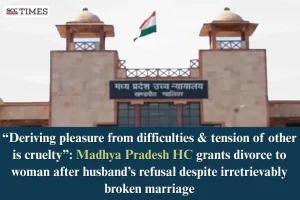Disclaimer: This has been reported after the availability of the order of the Court and not on media reports so as to give an accurate report to our readers.
Madhya Pradesh High Court: In an appeal filed by the wife against the Family Court’s judgment whereby her divorce petition on the grounds of cruelty and desertion was rejected, the Division Bench of Vishal Dhagat* and B.P. Sharma, JJ., allowed the appeal as well as the divorce petition, holding that the husband was treating the wife with cruelty by not giving her an option to live her life freely according to her choice and unnecessarily opposing the divorce when she was already living with another man. However, their marriage was invalid.
Background
The parties got married in 2002 as per Hindu rites and rituals and gave birth to two daughters. The wife contended that the husband would drink alcohol and assault her. He also demanded dowry and harassed her. She stated that she was tortured, beaten, character assassinated, and she was forcibly sent to her parental house in 2009 and in 2016. Thus, she filed the divorce petition, which was rejected. She also filed a case for maintenance, but it was withdrawn considering the future of the daughters.
The husband contended that he was caring for both daughters. He also stated that the wife had a second marriage in 2018 without obtaining a divorce; therefore, a complaint case under Section 494/34 of the Penal Code, 1860 (“IPC”) was filed against her second husband. He also contended that the wife used to treat him and the daughters with cruelty.
The Family Court held that the wife’s second marriage was invalid as she performed it during the subsistence of her first marriage and had a living spouse. Based on the second marriage, the Family Court presumed that the wife had an adulterous life, and she could not be given the advantage of her own misdoing. Thus, the Court dismissed the divorce petition via the impugned judgment, holding that granting divorce to the wife would be like granting a premium on misdeeds.
Aggrieved, the wife filed the present appeal.
Analysis
Upon perusal of the records, the Court found that previously, a joint divorce petition was preferred by the parties under Section 13-B of the Hindu Marriage Act, 1955 (“HMA”). In said petition, it was pleaded that the parties were living together in marital ties due to social compulsion despite no coordination, bitterness, tension, and ideological differences between them. The husband, as per their agreement, had paid Rs 50,000 by cheque, and the remaining Rs 50,000 was to be given on the date of evidence. Due to the conciliation, the petition was withdrawn, and the parties started living together. The application for the grant of maintenance was also withdrawn.
The Court further noted that after their living together for some time, the husband allegedly drove the wife out of the house in 2016. Thereafter, she married a second time, and she filed a divorce petition.
Noting that after separation, the wife was living in an invalid marriage with another man, whereas the husband was living with the daughters, the Court stated that there was a complete breakdown of marriage between the parties. The Court remarked that no purpose would be served if the petition were dismissed on the ground of fault of the wife, who performed a second marriage during the subsistence of the first marriage.
Noting that Section 13 of the HMA provided for divorce on the ground of irretrievable breakdown of the marriage, the Court stated that a Court cannot shut its eyes to practical difficulties and problems of parties. If divorce is not granted in cases of irretrievable breakdown of marriage, then it will amount to further pushing the party towards continuous pain and suffering.
“Irretrievable breakdown of marriage is a species within the genus of cruelty. Whenever there is an irretrievable or complete breakdown of marriage, then both parties are under pain and suffer day-to-day cruelty as they were not permitted to exercise their choices and option to choose their partners in life.”
The Court further remarked that when the other party opposes the prayer for divorce despite their being no possibility of living together, such conduct of the party deriving pleasure from difficulties and tension of the other party also amounted to cruelty.
Accordingly, the Court allowed the appeal as well as the divorce petition under Section 13(1) (ia) of the HMA, holding that the husband was treating the wife with cruelty by not giving her an option to live her life freely according to her choice, which is a fundamental right, and unnecessarily opposing the divorce petition when she was already living with another man though marriage between them was invalid.
The Court also concluded that the wife would neither have a right of alimony nor any claim of property against the husband.
[D v. E, 2025 SCC OnLine MP 8678, decided on 14-11-2025]
*Judgment authored by: Justice Vishal Dhagat
Advocates who appeared in this case:
For the petitioner: Sanjay Gupta
For the respondent: Yashovardhan Shukla


